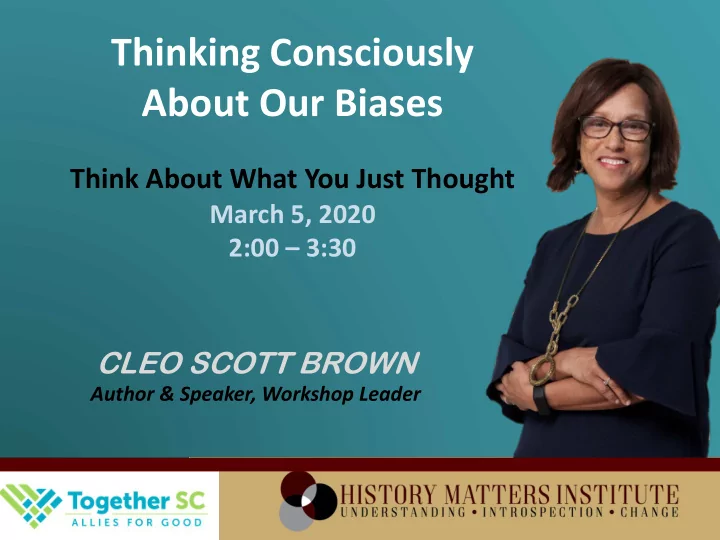

Thinking Consciously About Our Biases Think About What You Just Thought March 5, 2020 2:00 – 3:30 CLEO SCOTT BROWN Author & Speaker, Workshop Leader
Picture 1
Picture 2
Picture 3
Table Discussions
Before you received the first facts about each person, in the short time you were given, what did you look for or what did you see that helped you in your evaluation of the person’s educational level or income? Table 1
Some opinions are formed immediately when • we meet someone, without any facts The mind operates subconsciously, • automatically, based on an accumulation of a person’s various experiences and exposures. It is not designed to process inputs separately “Think About” Takeaways “Think About” Takeaways
Every single experience, including what we • see in the media, shapes our thoughts and opinions “Think About” Takeaways “Think About” Takeaways
Before you received the first facts about each person, in the short time you were given, you were told to evaluate the trustworthiness of a person. Quick evaluations are a necessary part of life. Identify examples in your work or community when you must quickly evaluate the trustworthiness of a person you have just met. Evaluating trustworthiness without facts is difficult. What clues did you look for today? Table 2
The brain immediately seeks to connect with • things in common In our minds, we connect certain looks to • certain personalities and behaviors Human beings are much more relaxed and • comfortable when they can find a likeness, a sharing of a common experience. “Think About” Takeaways
How were your ratings impacted by the first facts presented? In what ways did the high income of one parent and the low income of another parent impact opinions about the child’s earning potential? Were there big differences in ratings between attendees based on the same facts? If so, why? Give examples of how expectations for a low-income client base could impact decisions about the kinds and quality of opportunities funded or offered. Table 3
Adults and especially children, respond to our • expectations, high or low Our low expectations cause people to OD (operate • down) When we are the decision-makers, we have the power • to set limits on people through our own low expectations for them People boxed in for a long time move from a place of • frustration to a place of lost hope We have to let people out the box of low expectations • in which we have put them “Think About” Takeaways
How were your ratings impacted by the first and second facts presented? Did any facts create large changes in your ratings? Why? Were there big differences in ratings between attendees based on the same facts? Why? If something is a fact about a person, why can it lead to two very different results ? Table 4
Facts often don’t matter because they are • interpreted through the lens of our own personal exposures and experiences When exposures to other classes or cultures are • limited to our workplaces, our judgements of others who are different are generally based on media and hearsay. “Think About” Takeaways
This exercise has been conducted numerous times with USC graduate students. A consistent result from those workshops: The African American male is almost always rated as a college graduate across all three columns; however, the black female who graduated Harvard and Yale is rarely rated as a college graduate from her initial picture (with no facts) and her projected earnings tumble even lower when Fact 2 is presented (only her name). What was it that we saw or heard or that we didn’t see or hear that we identify with being educated? Can judging people by their looks cause you to miss great opportunities? Give some examples. Table 5
There can be inappropriate power given to a • name or a label Erroneous judgements are often made based on • looks Somehow low income has become synonymous • with a lack of ability when it is more likely a lack of exposure and expectation “Think About” Takeaways
This exercise has been conducted numerous times with USC Social Work graduate students. Normally, we tie criminal records with a lack of employment opportunities; however, graduate students gave more ratings in the two highest income categories for the person with the criminal record than the African American male who was rated by most people as having a college degree. What factors could have been considered that might have negated the negative impact of her criminal record or negated the positive benefit of his college degree? Could these negating factors be applied to other groups (i.e. different gender, class, race)? Could biases result in unearned benefits and unearned penalties for some people? If so, how? Table 6
An Empathy Bias
How Can We Address Empathy Bias? We must be purposeful in expanding our • experiences because we are automatically drawn to that which is comfortable We must value putting ourselves in different • environments, giving ourselves the opportunity to experience someone else’s reality “Think About” Takeaways
We ALL have an automatic response system • Automatic response systems do not change on • their own. After all, THEY ARE AUTOMATIC! We have to consciously give thought to what we • are thinking & how we are reacting to others We have to consciously critique whether we are • fairly evaluating those we serve and those with whom we have to interact SUMMARY TAKEAWAY
Conscious thinking stops us from putting so much valuation on the container that we miss seeing the contents. Thinking consciously is fundamental for REAL change!
Cleo Scott Brown Author Speaker, Workshop Leader Email: cleo@cleoscottbrown.com Website: www.cleoscottbrown.com Linkedin: www.linkedin.com/in/witness Phone: 843-860-7249
Recommend
More recommend